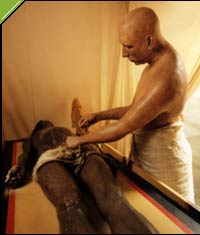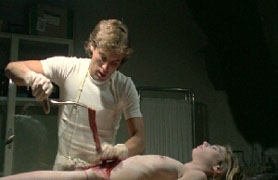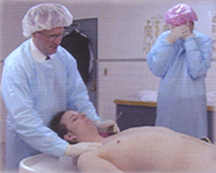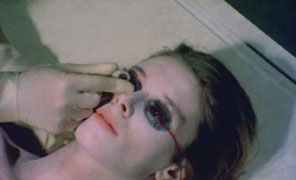 ARTS
& OPINION: So you like to work with the dead?
ARTS
& OPINION: So you like to work with the dead?
SEBASTIEN:
I like my work, which involves working with the deceased.
A &
O: But you chose a profession whose essential materials are
the dead?
SEBASTIEN:
To the best of my knowledge, my colleagues are quite alive as
are the families and friends of the deceased with whom I’m
in daily contact.
A &
O: Why didn’t you choose a normal profession, like social
work or teaching?
SEBASTIEN:
Embalming is perhaps an unusual choice, it’s not an abnormal
one. By the age of 9, I already knew I wanted to be an embalmer.
A &
O: That must have pleased your parents?
SEBASTIEN:
At the beginning, they weren’t at all that pleased, but
as I got older and they realized that’s what I wanted
to do in life, they accepted it and have been very supportive.
A &
O: How did your classmates react to your inclination?
SEBASTIEN:
Knowing how cruel kids can sometimes be, I guess I had the presence
of mind to keep my fascination with embalming a secret until
I was well into my teens. When I finally came out -- in a manner
of speaking -- most of my classmates respected my choice.
A &
O: Do you know or understand why, at such an early age, you
wanted to become an embalmer?
 SEBASTIEN:
Yes. I had to attend a funeral when I was young, and I was amazed
by the transformation on the deceased’s face, having just
seen and remembered that face ravaged by death. It was almost
as if the embalmer had brought the deceased back to life, so
convincing was his work.
SEBASTIEN:
Yes. I had to attend a funeral when I was young, and I was amazed
by the transformation on the deceased’s face, having just
seen and remembered that face ravaged by death. It was almost
as if the embalmer had brought the deceased back to life, so
convincing was his work.
A &
O: Analogous to a resurrection?
SEBASTIEN:
You could say that. The experience turned out to be a transforming
moment of my life, and I remember during those years that wanting
to become an embalmer was an obsession.
A &
O: Most of us on the outside regard you on the inside as a bit
weird. We imagine you with all sorts of hang-ups and social
phobias, that embalming is the refuge of the socially challenged.
Your comments?
SEBASTIEN:
I can’t speak for everyone in the profession, but without
exception, all of my fellow embalmers are normal and socially
well adapted. Like in all professions, I suppose there are bad
eggs, those who choose embalming for the wrong reasons, but
they are certified professionals subject to a professional code
of ethics.
A &
O: If a garbage collector’s kick comes when he finds something
valuable or newsworthy in the garbage, and a doctor’s
kick comes when he saves a patient’s life (depriving you
of work, of course), how do you get your professional kicks?
 SEBASTIEN:
In our line of work, most of the bodies we receive are in very
terrible condition; bodies that have been in terrible accidents,
burn victims,
bodies ravaged by cancer. Our challenge is to restore dignity
to the deceased, to rid their faces of suffering and anguish,
to transform their ugliness into something more beautiful than
when they were alive. The satisfaction comes when the families
view the embalmer’s work for the first time: the amazement
in their eyes, the pleasure at what they are observing. This
is my kick. Gone is the pain and suffering of the deceased’s
final days; he or she has found his peace and it shows in their
faces. In our special way, we are artists, bringing beauty into
the world, a beauty that will survive in the memory of the survivors.
The satisfaction of our work is in no small way an aesthetic
one.
SEBASTIEN:
In our line of work, most of the bodies we receive are in very
terrible condition; bodies that have been in terrible accidents,
burn victims,
bodies ravaged by cancer. Our challenge is to restore dignity
to the deceased, to rid their faces of suffering and anguish,
to transform their ugliness into something more beautiful than
when they were alive. The satisfaction comes when the families
view the embalmer’s work for the first time: the amazement
in their eyes, the pleasure at what they are observing. This
is my kick. Gone is the pain and suffering of the deceased’s
final days; he or she has found his peace and it shows in their
faces. In our special way, we are artists, bringing beauty into
the world, a beauty that will survive in the memory of the survivors.
The satisfaction of our work is in no small way an aesthetic
one.
A &
O: It must be frustrating that most people think you are weird?
SEBASTIEN:
I’m comfortable doing what I’m doing. I cannot allow
my work which I find meaningful to be held hostage by public
opinion. If people like you think people like me are weird,
that’s your problem.
A &
O: Aren’t we as a society avoiding the unpleasant facts
of death by covering up or editing out the death of the deceased,
dressing him/her up for big show?
SEBASTIEN:
The family members and friends who have spent time with and
cared for the dying cannot be accused of avoiding the unpleasant
facts of death.
A &
O: Do you develop relationships with the dead? Do their faces
reveal something of their lives, if they were happy or not,
if they were good or bad people?
SEBASTIEN:
As mentioned earlier, most of the deceased have suffered considerably
in the last days of their lives, have been administered strong
drugs, and this is what you see in their faces. It is during
my contact with family members that I try to learn of the deceased’s
life, his history, to arrive at a better likeness of the person
as he was in life. So yes, like their survivors, I think about
them, wonder about them, especially if I have access to photographs
that span their entire lives.
A &
O: From time to time, I’m sure, a perfectly healthy, perhaps
beautiful young body arrives. How does this affect you?
SEBASTIEN:
These are the most difficult cases, when someone young is brought
in, who hasn’t lived, whose life has been cut short. These
cases leave me with a feeling of terrible sadness.
A &
O: If I may be indiscreet, on those thankfully rare occasions
when young bodies arrive, the opportunities and temptation to
experiment with necrophilia might be considered an occupational
hazard. Would you care to respond?
SEBASTIEN:
Mr. Lewis. I am not sexually attracted to the dead.
A &
O: Do you ever hear of such behaviour within the profession?
SEBASTIEN:
We are certified professionals, not perverts.
 A
& O: In the brilliant Canadian film entitled Kissed,
the female protagonist, played by Molly Parker,
makes love to the dead because she is fascinated by the mystery
of death and believes she can get closer to it, by what she
refers to as “crossing over,” in order to contact
the deceased’s soul. As a viewer, I found her motivation
totally convincing, and her love making with the dead almost
sacred, easily more dignified that ours with the living. Your
response?
A
& O: In the brilliant Canadian film entitled Kissed,
the female protagonist, played by Molly Parker,
makes love to the dead because she is fascinated by the mystery
of death and believes she can get closer to it, by what she
refers to as “crossing over,” in order to contact
the deceased’s soul. As a viewer, I found her motivation
totally convincing, and her love making with the dead almost
sacred, easily more dignified that ours with the living. Your
response?
SEBASTIEN:
I have seen the film and wasn’t particularly impressed.
People who indulge in necrophilia are perverted and they need
professional help. Secondly, the premise of the film is flawed.
Dead bodies don’t arrive at our doorstep with erections.
I’ve embalmed over 1,500 bodies in my career and only
one or two have arrived in this state, and only after severe
abdominal bleeding has leaked blood into the penis. The movie
Kissed has propagated a negative stereotype about the
profession of embalming which is very unfortunate. And while
there may be a very small percentage of disturbed people among
embalmers they are the exceptions. There are periods during
the year when I’m on the job 70 hours per week. We have
a job to do and not enough time to do it. If you are looking
to categorize the gist of our work, our profession is similar
to that of restoration, where we try to bring something back
to its original state.
A &
O: Does working with the dead sharpen your appreciation of life?
SEBASTIEN:
Absolutely.
A &
O: Do you believe in God?
SEBASTIEN:
Yes.
A &
O: Do you ever question what kind of God it is that brings you
up close to bodies and faces that have suffered so terribly
in their last days?
SEBASTIEN:
First of all I don't question God's ways, nor do I regard him
as an executioner. Perhaps he doesn't permit suffering but rather
tolerates it.
A &
O: Thank you, Sebastian, for your time and frankness. I have
learned much today.
SEBASTIEN:
It’s been a pleasure discussing my life’s passion
with you. If I should be fortunate enough to outlive you, it
will be both a pleasure and privilege to embalm you.
A &
O: I’ll pass on that, hopefully for the long term.
COMMENTS
user-submission@feedback.com
That whole interview was wild from start to finish. The reporter
sounds like he had a few screws loose.
user-submission@feedback.com
Good of you Sebastien to stand up to the interview person who
wanted to bring you down and embarrass you. You put him in his
place and explained our work so beautifully -- it was something
I have always felt but I wasn't able to express it like you
did.
Huang_wu2@yahoo.com
That was enlightening, thank you for sharing.
cindyvaldez@hotmail.com
I am so very impress in how Sebastien kept his profile: very
professional. I would fancy to meet him as I am persuing the
career of an Embalmer. I find this profession like any other,
very interesting. For those people who think that persons like
Sebastien are weird, I would say that these people simply aren't
educated enough to accept that the art of embalming is respectful
career like any other. I would feel honour and fortunate to
put myself in Sebastien's hand when my times comes. Thank you
for such a educational interview.
tami.princesas@gmail.com
I am 18 years old, I am a senior of Clarke Central high school;
I want be a embalmer but I don't know if I am strong enough.
Can you give me a answer? Anything is good for my heart.
user-submission@feedback.com
I used to think that funerals were just a money making scam.
Then I watched an episode of Frontline which documented the
duties of a funeral director. These guys earn their money, not
just with the aftercare but especially when they get a first
call in the middle of the night and have to take a deceased
infant from its mother's arms.
hr4wop@gmail.com
I happen not to believe in embalming, wakes or funerals but
in no way am I here to disrespect anyone. I don't believe in
one making money off of the deceased although I know that it
isn't the deceased that walks into the funeral home. I think
the caskets are way overpriced ( like furniture ). I feel the
body has been through enough so why do what is done to it. Just
make it rest. I also wouldn't want someone who is not a loved
one being the last to take care of the body. I also think the
sooner the body is gone the faster the loved ones can grieve.
Why put them through a 2/3 day torture. Is it healthy for you
to observe your loved one deceased? To me it's everyone going
with the flow or ritual, not their true beliefs. People are
afraid to go against the grain. And just a side note. I don't
care who you are. If an embalmer has a great loss of their own
(own child), that to me I can see ending a career.
user-submission@feedback.com
For many people, embalming and reviewal are a more psychological
than aesthetic experience. A lot of people can gain closure
from seeing their loved one looking peaceful, especially if
the person was ill and in pain. I am a mortuary science student
at the University of Minnesota, and I have a live-in job at
a funeral home. Surprisingly, a couple of the funeral directors
I work with have actually participated in embalming loved ones
of theirs who have died. I'm still a student, thus I cannot
yet fathom being able to withstand that emotionally. Maybe it
brings some type of closure knowing that their loved ones will
be treated with utmost care and respect.
Furthermore, I don't consider our profession "making money
off of the deceased." We do a public service for people,
whether or not there is embalming. What would happen to dead
people if there were no funeral homes? The families would be
responsible for cleaning and disposing of the bodies. Most people
do not have the time, energy, or stomach for that when the time
comes. The same argument could be made about doctors. That they
are "making money off of sick people." We are in this
profession because we have deep compassion and empathy for people
during their time of need.
@tami.princess:
You should look around your area for night attendant positions
at funeral homes. Or even just talking to a funeral director
can help. If you find a website for a funeral home and send
them an email, I'm sure the director would be more than happy
to meet with you and answer any questions you had. I applied
to the program of mortuary science at the U of M and was thrilled
about my acceptance, but was also unsure of what I was getting
myself into. So I emailed and met with a funeral director. She
answered many of my questions and eased a lot of my worries
and I wound up being offered a live in job. It's a great educational
experience and I feel very lucky to have this job. If you hate
it, you can always quit and then you know if you're up for the
job before you dive head first into classes in college.